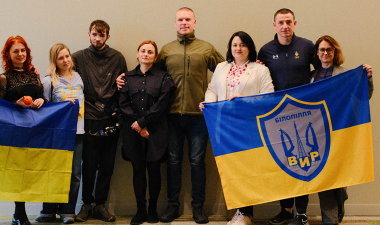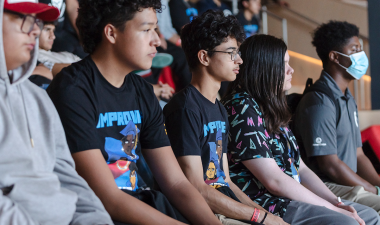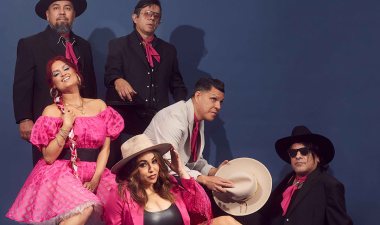Navigating the complexities of college life can be daunting for any student, but for Stanislaus State’s Jeanette Jones, her journey includes another challenging layer.

Jones, a graduate student pursuing a master’s in marriage and family therapy, is blind and faces mobility challenges due to a genetic condition. However, that hasn’t stopped her from pursuing her goals.
“As a student, I’ve faced challenges, particularly in ensuring that textbooks and materials are accessible for me as a blind student,” Jones said. “The Disability Resource Services (DRS) team has been exceptional in providing the support I need, making all materials accessible and offering proactive assistance.”
Jones adds that the University’s golf cart service is another resource that helps maneuver the campus more efficiently.
“The support from DRS and accommodations have been crucial in my academic journey,” she said. “Students with disabilities have every right to pursue their academic and career goals. I've felt genuinely supported and included by my cohort and most instructors.
“The collaborative spirit among my peers and the faculty’s commitment to inclusivity have made the challenging journey of graduate school much more manageable and rewarding.”
July is Disability Pride Month and Jones is one of many campus community members who are celebrating the occasion by sharing their personal stories to showcase their pride, foster understanding and remove the stigma of living with a disability.
Disability Pride Month commemorates the signing of the Americans with Disabilities Act (ADA) into law on July 26, 1990. The first Disability Pride Day was held in Boston in 1990, and the first official Disability Pride Month was celebrated in 2015, the 25th anniversary of the ADA.
The month marks an opportunity to promote visibility, awareness and appreciation for the disability community and celebrate the numerous ways people living with disabilities—whether visible, invisible, mobility, cognitive, vision, hearing, learning sensory, developmental and others—add to diverse tapestry of our society.
“This is one area of diversity that is completely and totally ignored,” said DRS Director Marvin Williams. “Most people don't think of disability as part of diversity when it actually is. One of the things I looked at with my team is trying to change some of that deficit mindset.
“The way I see it, the main goal of Disability Pride Month is to celebrate students with disabilities and their achievements and to knock down the stigma. The biggest thing I see is stigma. Hearing people do everything they can to avoid saying the word ‘disability’ is just troublesome.”
Williams has heard this sentiment from students who want and need accommodations but don’t want anyone to know.
“The thing that I often tell them is, ‘You realize that you're not going to wake up tomorrow and not have a disability, right? It is a part of who you are.’ I’m a firm believer that if you want to get rid of the stigma, one of the things you to do is face it head on and start to talk about it.”

Student Jose (JC) Aguirre, who is pursuing a bachelor’s degree in biological sciences has a visual impairment and other disabilities, says that Disability Pride Month allows him to celebrate his identity and the strength of those within the disabled community.
“It’s an opportunity to embrace and showcase the diverse abilities that make our community unique,” Aguirre said. “I observe it by participating in events that promote awareness and inclusion, sharing my experiences to advocate for accessibility and by connecting with others to build a supportive network.”
He encourages those living with a disability to embrace it fully “with all its limitations and benefits.”
“To take pride is to not only accept your disability but fully internalize it as a part of your being,” he said. “I make sure to always express to those around me how blessed I am to have been born disabled. Without my disability, I know I would not be as good a person as I am. It has shaped me into the man I am today.”
Jones encourages students needing support to reach out to DRS.
“Taking proactive steps and seeking available resources will empower you to succeed academically and professionally. Utilize DRS to ensure you receive the necessary accommodations for equal access to education,” she said. “It’s crucial to advocate for yourself and communicate your needs to your professors and support staff to create an accessible and supportive learning environment.”
Furthermore, she adds, campus community members and allies can demonstrate their support by actively promoting accessibility and understanding.
“That involves providing accessible materials, being proactive in offering accommodations, fostering an inclusive classroom environment and participating in disability awareness programs,” Jones said. “Advocacy can also include speaking up against discrimination and working with Disability Resource Services to ensure all students receive the necessary support to succeed academically and socially.
“By embracing these practices, the University community can create a more inclusive and supportive environment for all students.”
To learn more about resources available through Disability Resource Services, visit their website. You can also follow them on Instagram, where this month, they are sharing affirmations and student profiles in observance of Disability Pride Month.



